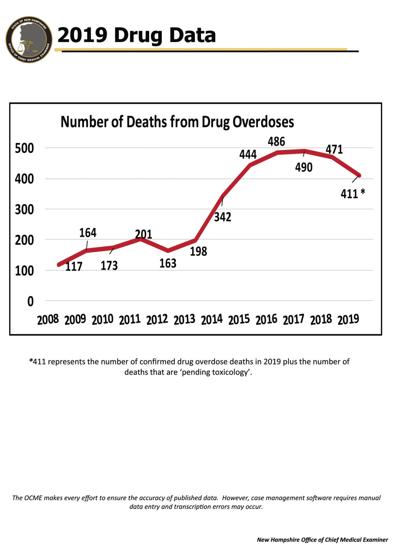LACONIA — The number of drug overdose deaths in New Hampshire appears to be slowly decreasing, although more than 400 people died in 2019 and Laconia is among a half-dozen cities with the most deaths, according to figures provided by police and the state Medical Examiner.
There were 328 confirmed drug deaths in the state last year and 83 suspected drug overdose deaths pending confirmation through toxicology testing, bringing the likely final tally to 411, the medical examiner said in a report last week.

The deaths are heart-wrenching for family, friends and the drug-counseling community.
"I have had the painful, emotional experience of opening up the newspaper and seeing a client in the obituary column," said Michael Tensel, a licensed drug and alcohol counselor with an office on Main Street.
"I've had voicemails from distraught parents that their family member won't be making it to their appointment because they have passed away."
Tensel said sometimes people overdose because they don't realize the potency of the drug they are taking. Other times, they may have been off drugs for a time and didn't realize their tolerance to the substance has declined.
He said many people became dependent on opioid-based prescription pain relievers and then moved on to street drugs when they could no longer get their medication.
Reasons for decline
Phil Spagnuolo, one of the founders of Navigating Recovery, said he is encouraged with the decline.
“But one of the big factors as to why it has come down is that Narcan is more readily available,” he said.
Narcan, which is carried by emergency responders and is available to the public, can reverse a potentially fatal overdose if administered soon enough.
Public attention on deadly opioids has led more people to meth, which is a very debilitating drug but less likely to cause immediate death, Spagnuolo said. He also suspects more people are dying of alcoholism.
The statewide drug death toll of 411 represents a decline from 471 in 2018, 490 in 2017 and 486 in 2016. There were 198 overdose deaths in 2013, before fentanyl, a highly potent and dangerous synthetic opioid, was in general use.
On the positive side, the state is doing a better job in helping those with substance abuse disorder through its Doorway program, which is intended to streamline the process for those with drug dependency to get the help they need, Spagnuolo said.
He said there is also greater availability of medication-assisted treatment and better public education about drugs.
Treating the person
Still, there is often too long of a wait for services and not enough access to treatment for the mental health problems and psychological trauma often associated with drug dependency issues, Spagnuolo said. There aren’t enough places for people in recovery to live or jobs for them to work.
Those with a drug arrest in their background have particular difficulty in finding employment, an apartment or a student loan.
“The truth is we are still way behind,” he said. “If we can get people sober, how do we keep them sober?
“We still have a check-the-box application, so someone convicted of a felony possession charge may never get a job interview. Now the rest of their life is ruined.”
The key is to treat the drug problem as the health crisis that it is, he said.
Laconia’s problem
Laconia Police Chief Matt Canfield said there were eight fatal overdoses in the city last year, compared to 12 in 2018. He also said that through November of last year, the city had 53 total overdoses, compared to 109 in 2018.
According to the medical examiner’s report, Manchester led the state last year with 78 confirmed and pending overdose deaths, Nashua had 36, Rochester had 22, Concord had 12, Seabrook had 11 and Dover had nine.
Although Laconia has only about half of Dover’s population of 31,000, it only had one fewer overdose death.
Spagnuolo said generational poverty and generational substance use in Laconia contributes to its problems.
“I showed up here in 1979 as a seventh grader and before that, I had never taken a drink,” he said. “Here, the only thing kids were doing was going out in the woods drinking.”
He said some rural areas have particularly high drug use statistics that appear to be connected with socioeconomic factors and a perceived absence of opportunity.
Spagnuolo, who is running for the state Senate, runs sober living houses.
“People in their 20s talk to me about using drugs with parents and grandparents,” he said. “I can’t even imagine that. It speaks to how deeply ingrained this problem is for us, but it’s not specific to New Hampshire. I’ve heard that story more times than I can count.”
Reason for optimism
Jacqui Abikoff, of Horizons Counseling Center, struck an optimistic note.
She believes the trend of declining drug overdose deaths may well continue.
She said there has been a gradual decrease in the stigma associated with drug dependency and a greater understanding that help is available.
“Treatment programs are becoming more creative,” Abikoff said. “Waiting lists have come down and there is an understanding that some treatment is better than a wait list.
“If you can’t get the level of care you need, let’s wrap around you and keep you engaged until you can get what you need.”
Daisy Pierce, executive director of Navigating Recovery, said progress is being made.
"Although Laconia is among a half-dozen cities with the most deaths, we are also among the communities doing great collaborative work," he said. "Our community efforts include Eric Adams at the Laconia PD, Navigating Recovery, The Doorway at LRGH, The Recovery Clinic, Horizons Counseling, IDN 5, CORE Program, Recovery Court, ACERT, etc.
"Next steps could be safe syringe programs, respite beds, and more supportive housing. I know it is of little comfort to a family with a loved one struggling, but I am optimistic about where we are at compared to where we came from. We will keep fighting this public health crisis until our efforts are no longer needed."


















(0) comments
Welcome to the discussion.
Log In
Keep it Clean. Please avoid obscene, vulgar, lewd, racist or sexually-oriented language.
PLEASE TURN OFF YOUR CAPS LOCK.
Don't Threaten. Threats of harming another person will not be tolerated.
Be Truthful. Don't knowingly lie about anyone or anything.
Be Nice. No racism, sexism or any sort of -ism that is degrading to another person.
Be Proactive. Use the 'Report' link on each comment to let us know of abusive posts.
Share with Us. We'd love to hear eyewitness accounts, the history behind an article.